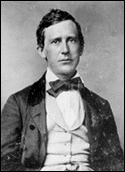Stephen Collins Foster was born on the Fourth of July in 1826 in Lawrenceville, Pennsylvania, the youngest child of William Barclay Foster, a prominent Pittsburgh merchant and Lawrenceville's founding father, and his wife Elizabeth Clayland Tomlinson.
Foster's musical talent was evident early on. At the age of seven, he came across a flute in a general store. Although he had never seen one before, he picked it up and had mastered it before leaving the store. He was soon proficient on both the flute and the piano. He wrote his first piece of music, "The Tioga Waltz," while he was still in school and at sixteen published his first composition, "Open Thy Lattice, Love."

Despite his obvious talent, Foster did not at first consider a career as a composer. After leaving Jefferson College in Coonsburg at the age of 15, he moved to Cincinnati and took a position as a bookkeeper with his older brother Dunning. But the music would not be denied. In 1845 he composed "Old Uncle Ned," followed by "Oh! Susanna" in 1846. Both songs were published and proved to be immensely popular. Around this time, Foster also developed an interest in the minstrel stage and began writing songs for impresario Edwin Christy's minstrel shows. In 1848 Foster closed his account books and returned to Pittsburgh to take up music in earnest.
In 1850 Foster married Jane Denny McDowell, the daughter of a Pittsburgh physician, and the newlyweds moved to New York City, where Foster hoped to advance his career and earn a respectable living. Although homesickness drove the Fosters back to Pittsburgh within the year, the realization that there was a demand for his work brought him to the city again in 1860, this time on his own. Although Foster's songs were well known and sung throughout the country, he was not blessed with good business sense and had not made himself into a recognizable public figure. As the liner notes accompanying baritone Thomas Hampson's 1992 recording of Foster songs (American Dreamer, EMI Records) point out, an arrangement with Christy early in Foster's career allowed Christy "to premiere and even claim authorship for Foster's songs. By the time Foster began to seek recognition for his remarkable work--not to mention need the recognition (and money)--his audience was slow to respond."
Foster continued to write, although the spectacular successes he had enjoyed early on came less frequently. His songs were not always well received, and he began to drink heavily. Jane had long since left him. An accidental fall in a hotel room during a bout of fever sent him to Bellevue Hospital with a severe gash in his throat. Loss of blood and his general weakened condition proved to be a lethal combination, and Foster died on January 13, 1864. He was just 38 years old. His remains were returned to Pennsylvania and laid to rest in Allegheny Cemetery beside his parents.
An ardent wartime supporter of the Union whose only personal acquaintance with the South was a short riverboat trip to New Orleans, made soon after his star began to rise, Foster nevertheless had an instinctive feel for the pace and atmosphere of life below the Mason-Dixon Line. Many of his best-loved and most enduring songs concern life on the plantation, among them "Old Black Joe," "My Old Kentucky Home," "Ring, Ring the Banjo," "Old Folks at Home," "Camptown Races," and "Massa's in De Cold Ground." Some of the other classics that Foster composed in his short but brilliant life are "Gentle Annie," "Jeannie With the Light Brown Hair," "Come Where My Love Lies Dreaming," "Beautiful Dreamer," "Hard Times," and "Ah, May the Red Rose Live Alway."
"Ah! May the Red Rose Live Alway" || "Beautiful Dreamer" || "Camptown Races" || "Gentle Annie" || "Glendy Burk" || "Hard Times, Come Again No More" || "Massa's in De Cold Ground" || "My Old Kentucky Home" || "My Wife Is a Most Knowing Woman" || "Oh! Susanna" || "Old Black Joe" || "Old Folks at Home" || "Ring, Ring the Banjo" || "That's What's The Matter"